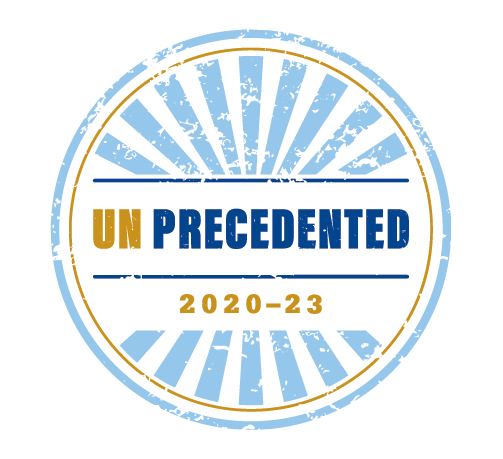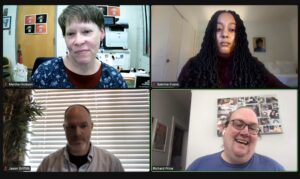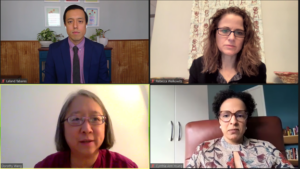Keeping with Precedent, CALS’s “Unprecedented” Webinar Series Enters Its Third Year

The title of CALS’s “Unprecedented” webinar series was always a bit tongue-in-cheek. According to CALS director Sean Goudie, the series—which kicked off its third year of programming on December 9—was born of a “healthy skepticism about the overuse and abuse of the term” unprecedented in media coverage of the COVID-19 pandemic. As Goudie explains, the pandemic “was not, in fact, ‘unprecedented’ to many populations and peoples across space and time.” The sociocultural developments of the past several years—including anti-Black police violence, economic and institutional collapse, and resultant political activism and uprisings—are likewise wholly precedented but take on a new meaning and urgency in the midst of an ongoing global pandemic.
These developments, which Goudie calls “attendant” to the pandemic, have served as inspiration for the “Unprecedented” series throughout its three-year history. While COVID-19 was the impetus, both practically and thematically, for the series, the webinars themselves have turned their attention more broadly to facets of “American literature, culture, and society that are singular, exceptional, defining, remarkable, uncommon and/or even bizarre,” explains Goudie.

This year’s first webinar, “Banding Together to Challenge Book Bans”, considered how literary censorship—by no means a new phenomenon—has gained in virulence over the past several years. CALS Summer Fellow and PhD candidate in English and African American Studies Sabrina Evans, who moderated the webinar, notes how “with social media and the current political climate, book banning has increased and become more widespread compared to the past, when book banning seemed to occur in more individual, local contexts.” Evans also commended the panelists—librarian Martha Hickson, political science professor Richard Price, and education professor Jason Griffith—for reminding the audience of “several points of intervention [to] take up themselves” in their own communities, such as participating in school board meetings and supporting anti-censorship school board candidates.
Past CALS graduate research assistant and 2021-22 “Unprecedented” organizing committee member Joe Glinbizzi has also taken a number of lessons from these webinars—lessons that extend beyond the nominal topic of the webinar and reveal the larger import of American literary and cultural studies. He fondly recalls a panelist on last spring’s “The Role of the Humanities in Addressing Vaccine Hesitancy”, Dennis Yi Tenen, who emphasized “literature's myth-making power (and literary studies' ability to take account of it).” Glinbizzi was also struck by “Dorothy Wang's provocative and incisive opening statement" for "Sizing Up The Chair", in which Wang argued that the show, while "purportedly told from the point-of-view of an Asian-American woman" was in fact ventriloquizing the politics of "a white liberal woman" and using the nonwhite protagonist as "a mouthpiece or beard." Wang's perspective on the popular Netflix series, says Glinbizzi, "remains seared in [his] memory."

Glinbizzi’s comments speak to a central concern of the “Unprecedented” organizing committee each year: how to craft a slate of programming that, in Goudie’s words, is “provocative, engaging, informative, and appealing to a remarkably diverse audience of academics and members of the general public.” While some webinars, like year one’s “American Literary Studies Beyond the Brink”, are designed with a more narrow audience in mind, others, like the upcoming “Serial, True Crime, and Podcasting’s ‘Golden Age’”, engage more directly with pop culture and are meant to capture the interest of those both within and outside the academy.
Rob Nguyen, PhD candidate in English and Visual Studies at Penn State, will be moderating this next podcast, which will feature special guest Sarah Koenig, the host and co-creator of the Peabody Award-winning Serial podcast and Executive Producer of Serial Productions. Nguyen, like many others, “vividly remember[s] the recent past in which Serial became a cultural phenomenon.” He looks forward to the panel discussion—which will include professors from such diverse disciplines as criminology, American studies, and film production and media studies—and anticipates the panelists will grapple with “the moral questions or dilemmas that surround True Crime as a genre.” Comparing true-crime podcasts to other “popular entertainment[s]” like “war or police dramas,” Nguyen wonders if “the emphasis on the ‘true’-ness of it in the very name of the genre itself is pointing towards what might be particularly compelling to audiences.”
Genre is also a key factor in the continued success of the “Unprecedented” series. The webinar format by its very nature has expanded CALS’s reach beyond the English department, the College of the Liberal Arts, and indeed beyond the university itself. Some of this is a function of the form’s convenience; as Goudie notes, “attendees aren’t burdened with having to get in their vehicles if they’re at home, or racing across campus, to hurriedly get to the event.” Additionally, because the webinars are recorded and posted to the CALS website, those who might like to attend but have a scheduling conflict can watch on their own time. The ability to archive the webinars “makes their impact durable and far-reaching in ways that the time/place-specific nature of live, in person events typically are not,” says Goudie.
That durability extends not just to individual webinars, but also to the “Unprecedented” series as a whole. Goudie suspects that, “given the ongoing positive response to it, we’ll definitely keep organizing and hosting the ‘Unprecedented’ webinar series this year and, most likely, in the future.” Glinbizzi agrees, analogizing “[t]he slate of webinars each year” to “an anthology TV series: an eclectic and selective mix of high-quality shows [that are] both reliable” and “continually inventive.” Under Goudie’s direction—and collaborating closely with an annually rotating committee of graduate and undergraduate student organizers—it seems that the “Unprecedented” webinar series is set to become the exact opposite of its title: an established (and much-anticipated) tradition.

The title of CALS’s “Unprecedented” webinar series was always a bit tongue-in-cheek. According to CALS director Sean Goudie, the series—which kicked off its third year of programming on December 9—was born of a “healthy skepticism about the overuse and abuse of the term” unprecedented in media coverage of the COVID-19 pandemic. As Goudie explains, the pandemic “was not, in fact, ‘unprecedented’ to many populations and peoples across space and time.” The sociocultural developments of the past several years—including anti-Black police violence, economic and institutional collapse, and resultant political activism and uprisings—are likewise wholly precedented but take on a new meaning and urgency in the midst of an ongoing global pandemic.
These developments, which Goudie calls “attendant” to the pandemic, have served as inspiration for the “Unprecedented” series throughout its three-year history. While COVID-19 was the impetus, both practically and thematically, for the series, the webinars themselves have turned their attention more broadly to facets of “American literature, culture, and society that are singular, exceptional, defining, remarkable, uncommon and/or even bizarre,” explains Goudie.

This year’s first webinar, “Banding Together to Challenge Book Bans”, considered how literary censorship—by no means a new phenomenon—has gained in virulence over the past several years. CALS Summer Fellow and PhD candidate in English and African American Studies Sabrina Evans, who moderated the webinar, notes how “with social media and the current political climate, book banning has increased and become more widespread compared to the past, when book banning seemed to occur in more individual, local contexts.” Evans also commended the panelists—librarian Martha Hickson, political science professor Richard Price, and education professor Jason Griffith—for reminding the audience of “several points of intervention [to] take up themselves” in their own communities, such as participating in school board meetings and supporting anti-censorship school board candidates.
Past CALS graduate research assistant and 2021-22 “Unprecedented” organizing committee member Joe Glinbizzi has also taken a number of lessons from these webinars—lessons that extend beyond the nominal topic of the webinar and reveal the larger import of American literary and cultural studies. He fondly recalls a panelist on last spring’s “The Role of the Humanities in Addressing Vaccine Hesitancy”, Dennis Yi Tenen, who emphasized “literature's myth-making power (and literary studies' ability to take account of it).” Glinbizzi was also struck by “Dorothy Wang's provocative and incisive opening statement" for "Sizing Up The Chair", in which Wang argued that the show, while "purportedly told from the point-of-view of an Asian-American woman" was in fact ventriloquizing the politics of "a white liberal woman" and using the nonwhite protagonist as "a mouthpiece or beard." Wang's perspective on the popular Netflix series, says Glinbizzi, "remains seared in [his] memory."

Glinbizzi’s comments speak to a central concern of the “Unprecedented” organizing committee each year: how to craft a slate of programming that, in Goudie’s words, is “provocative, engaging, informative, and appealing to a remarkably diverse audience of academics and members of the general public.” While some webinars, like year one’s “American Literary Studies Beyond the Brink”, are designed with a more narrow audience in mind, others, like the upcoming “Serial, True Crime, and Podcasting’s ‘Golden Age’”, engage more directly with pop culture and are meant to capture the interest of those both within and outside the academy.
Rob Nguyen, PhD candidate in English and Visual Studies at Penn State, will be moderating this next podcast, which will feature special guest Sarah Koenig, the host and co-creator of the Peabody Award-winning Serial podcast and Executive Producer of Serial Productions. Nguyen, like many others, “vividly remember[s] the recent past in which Serial became a cultural phenomenon.” He looks forward to the panel discussion—which will include professors from such diverse disciplines as criminology, American studies, and film production and media studies—and anticipates the panelists will grapple with “the moral questions or dilemmas that surround True Crime as a genre.” Comparing true-crime podcasts to other “popular entertainment[s]” like “war or police dramas,” Nguyen wonders if “the emphasis on the ‘true’-ness of it in the very name of the genre itself is pointing towards what might be particularly compelling to audiences.”
Genre is also a key factor in the continued success of the “Unprecedented” series. The webinar format by its very nature has expanded CALS’s reach beyond the English department, the College of the Liberal Arts, and indeed beyond the university itself. Some of this is a function of the form’s convenience; as Goudie notes, “attendees aren’t burdened with having to get in their vehicles if they’re at home, or racing across campus, to hurriedly get to the event.” Additionally, because the webinars are recorded and posted to the CALS website, those who might like to attend but have a scheduling conflict can watch on their own time. The ability to archive the webinars “makes their impact durable and far-reaching in ways that the time/place-specific nature of live, in person events typically are not,” says Goudie.
That durability extends not just to individual webinars, but also to the “Unprecedented” series as a whole. Goudie suspects that, “given the ongoing positive response to it, we’ll definitely keep organizing and hosting the ‘Unprecedented’ webinar series this year and, most likely, in the future.” Glinbizzi agrees, analogizing “[t]he slate of webinars each year” to “an anthology TV series: an eclectic and selective mix of high-quality shows [that are] both reliable” and “continually inventive.” Under Goudie’s direction—and collaborating closely with an annually rotating committee of graduate and undergraduate student organizers—it seems that the “Unprecedented” webinar series is set to become the exact opposite of its title: an established (and much-anticipated) tradition.